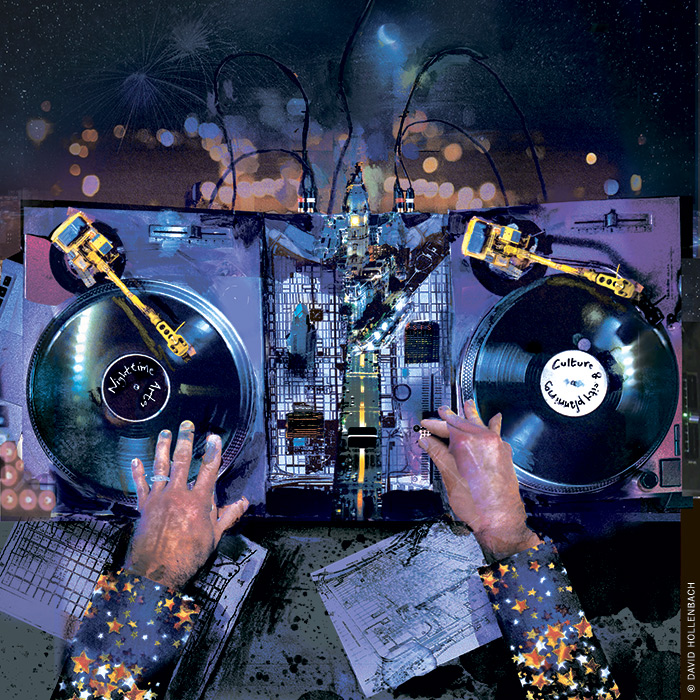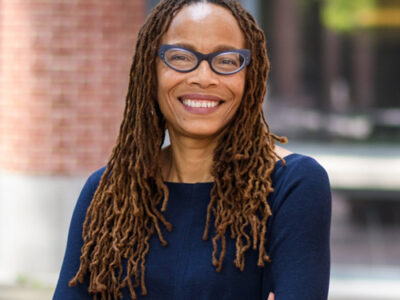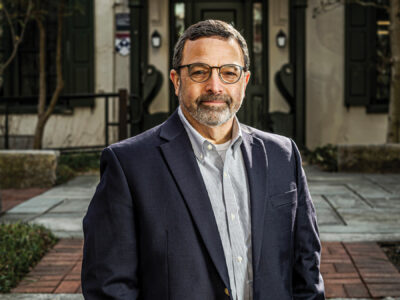
DJ “Michael the Lion” (also a researcher and lecturer in the Weitzman School of Design) is a big believer in the nighttime economy.
The Japanese used to call it the floating world: hours of darkness when urban pleasure seekers tore the figurative veil from their public faces and partied at theaters and restaurants.
Michael Fichman GCP’16 GFA’16, a researcher and lecturer in urban spatial analytics at Penn’s Weitzman School of Design, more practically refers to this burning of the midnight oil as a “nighttime economy.” And he believes it’s rife with opportunities for “licensing and zoning and transportation changes, harm reduction, inclusivity, safety and lighting improvements, and bringing government and community partners together.”
Fichman waxes poetic about the “spiritual undertones of the darkness” too. “I’ve experienced a lot of amazing, fantastic things that took at place at night, in the city,” he says. “I don’t think I’m alone in that.”
The way that the 39-year-old city planner talks about the night “depends completely on the audience,” he admits. “Some intrinsically understand that different kinds of communities need the nighttime to assemble and congregate and feel safe together. Others are turned off by that idea.” Fichman—who’s also been deejaying since high school, using the name “Michael the Lion”—may align himself most closely with those who create, consume, and cruise during the night, but he recognizes that he can best advocate for them by speaking the language of city planning.
Since joining PennPraxis, the applied-research arm of the Weitzman School, in 2016, Fichman has worked on several projects related to fostering and bolstering nighttime economies, including editing and contributing to the Global Nighttime Recovery Plan, a guide for cities in the post-pandemic era; consulting for the Creative Footprint, an initiative to map and index urban creative spaces for client cities including New York, Berlin, and Tokyo; and founding 24HRPHL, a resource for Philadelphia’s nightlife community.
Two years ago Fichman was invited to serve on the Philadelphia City Council’s arts and culture task force and was named cochair of its nightlife committee. That body soon called for the creation of a nighttime economy office and this summer Raheem Manning, Fichman’s cochair on the committee, took office as the city’s first nighttime economy director. The position, popularly referred to as “night mayor,” has been around for about a decade, institutionalized first in Amsterdam and now in about 50 cities including Paris, London, Tel Aviv, and New York.
As Fichman points out, “night mayors” are not in charge of the city when daytime mayors go to sleep; instead, they are responsible for coordinating municipal services, regulations, and engagement between the government and nighttime businesses and communities. Too often, he believes, fear, protection, and a “culture of no” have governed the night. “The night city’s going to be the night city,” he says. “If you take a deliberative and supportive approach to managing it, you get better outcomes when it comes to safety and harmony.”
Nursing an old-fashioned cocktail one recent Saturday evening at the Writer’s Block Rehab, a boîte located in a standalone three-story building on a grungy block near Washington Square, Fichman has a sleepy-eyed gaze and bemused manner reminiscent of Bill Murray. He leans back and considers a question about the dual life that he refers to as a “Venn diagram of nighttime arts and culture and city planning.”
Born in Pittsburgh, Fichman fell in love with the lure of the night early. As a teenager at Taylor Allderdice High School, he landed smack in the middle of a new generation of hip-hop artists. (Rappers Wiz Khalifa and Mac Miller graduated from the same school a few years after him). “I would go to parties in the park,” he recalls, “and look at the DJ and think, ‘I don’t know how to talk to girls, I don’t know how to breakdance, I can’t buy a beer. But I love music. That’s who I want to be.’”
After graduating from Haverford College, he was all set to pursue a PhD at the Marine Biological Laboratory. But his once fledgling career as a DJ had taken off and “people were flying me all over the place [for gigs],” so he decided grad school could wait for a beat or two. He eventually settled in Philadelphia, where “this form of DJing was being perfected by Jazzy Jeff, Cosmo Baker, King Britt—everyone was looking to Philly. I was part of that scene and I guess it was a matter of a rising tide lifting all boats.”
It was his friend, neighbor, and fellow night owl Ken Steif GFA’09 Gr’15 that encouraged Fichman to consider coming to Penn to study planning. When Steif, who ran the Master of Urban Spatial Analytics (MUSA) program, died in 2021 from a rare form of cancer [“Obituaries,” Jan|Feb 2022], Fichman—by then a lecturer in the department—seemed the natural choice to step in as its acting director.
Along with that responsibility, Fichman maintains a crammed schedule that has him consulting for cities, performing in clubs (from the divey Dolphin Tavern in South Philly to the fancy Four Seasons), running his own record label, and enjoying family time with his wife and two kids in West Philadelphia. In the MUSA courses that he teaches—including Public Policy Analytics, Smart Cities Practicum, and Land Use and Environmental Modeling—his varied skills and interests merge. “These students and me, we’re very much alike,” he says. “And so we find each other. I’ve had students who are musicians, standup comedians. … This work is especially exciting for them because they have an intuitive grasp of why nighttime arts and culture are important and an appreciation for the concerns of the people who populate them.”
Too often, he continues, nightlife boosters stress the economic impact of what they do. “It’s natural to do that when you’re speaking to tourism officials or economic development people,” Fichman observes. “But you’re never really going to beat other sectors. I prefer to use a different lens to view the way night economies contribute to cities: how multidisciplinary are these spaces? How old and how big are they? How much local and experimental programming do they offer? How much do they promote artists versus food and drink? We need to learn to think of the urban nighttime as a thing that’s specific and unique.”
—JoAnn Greco




